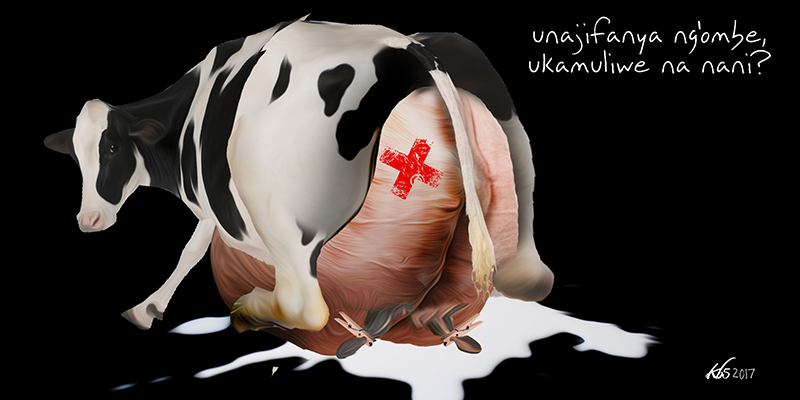On November 3, 2017, Kenya’s main opposition party, the National Super Alliance (NASA), spelt out to its supporters the names of three companies whose products they ought to boycott because of these companies’ association with the ruling Jubilee party. The three companies were: Safaricom, the giant money-minting mobile telecommunications company; Brookside Dairies, the largest milk-producing company in East and Central Africa; and Bidco Industries, one of the leading edible oil products manufacturer in this part of the world.
One month later, how has the embargo faired?
The better option?
Bina Wambui has been selling mobile phones’ airtime and sim cards for well over a decade in Nairobi’s city centre. She is an agent for both Safaricom and its main competitor Airtel. Her Charity Sweepstake-type kiosk is located on Moi Avenue, one of the busiest streets in the central business district. “Let me be honest with you,” she told this writer. “The boycott on Safaricom is definitely working. Does Baba (Raila Odinga) have shares in the company (Airtel)?” she asked me, half in jest. “His bonuses should be coming up well. Airtel has a lot to thank Raila for.”
“Let me be honest with you,” she told this writer. “The boycott on Safaricom is definitely working. Does Baba (Raila Odinga) have shares in the company (Airtel)?” she asked me, half in jest. “His bonuses should be coming up well. Airtel has a lot to thank Raila for.”
Bina told me that one of the biggest revenue streams for Safaricom remains the mobile money transfer service M-Pesa. The others are airtime for making voice calls and bundles for surfing the Internet. “My M-Pesa customers are still intact, but Safaricom customers for airtime and sim cards have dipped. I have sold more Airtel sim cards and airtime than at any other time,” she said.
On the day I went to interview her, she told me she had just received her day’s bonus from Airtel’s management. She did not divulge how much the bonus amounted to, but she said it was a good incentive for any Airtel agent who is keen on pushing sales. “An Airtel supervisor, not believing the money I am making in selling Airtel cards and airtime, came personally to see me at my kiosk,” said Bina. “I cannot complain. While my Safaricom sales have been fluctuating, my Airtel sales have been soaring. Should I call it a blessing in disguise?”
“I bank money every single day – money that I cannot dare venture out with from my kiosk. That should give you an inkling of the sales I make in a day.” Bina told me that mobile telecommunication products salespeople who operate in the central business district hold weekly meetings. “The story is the same from the rest of my colleagues: unprecedented booming Airtel sales. Now, the company is even giving a bonus for airtime sold apart from every sim card sold – even on the lowest airtime of 20 bob, you get a bonus.”
However, not all her Safaricom customers have jumped ship. “I will tell you why my M-Pesa customers are still with me: Airtel money transfer is very poor – it is inefficient and hopelessly disorganised and slow – its network is perpetually on a hang mode and if, by bad luck, you make a mistake, it takes between three to four days to sort out the problem. It is too much trouble for a supposedly cheaper money transfer system,” noted Bina. “If only Airtel would fix its money transfer issues, it would really give Safaricom a run for its money.”
A former senior Safaricom executive told me that the sprawling Eastleigh “town” or “little Mogadishu” – so named because of its large Somali population – together with the famous Kibera slum represent the largest Safaricom markets in Nairobi city. Between them, they generate for Safaricom millions of shillings in profits.
“Eastleigh might not be the best place to gauge whether the Kenyatta family’s products are faring well or not,” he said. “There has been a deliberate effort by hoteliers and restauranteurs in Eastleigh and elsewhere where there are food outlets to promote camel milk.”
Eastleigh – which is today a commercial hub of every imaginable type of business, as well as humungous residential estates and three-star hotels – has some of the biggest and busiest Safaricom shops anywhere in the country as well as small retail traders and street vendors hawking airtime and sim cards. My random check on the impact of the Safaricom boycott showed that Airtel had increased its airtime and sim cards sales in this area.
Near the famous Garissa Lodge shopping mall, a woman was selling Safaricom and Airtel airtime from the boot of her car. “Do I need to answer your question of whether the boycott is working?” she asked me. In the fifteen minutes I watched her mostly sell sim cards, only one asked for a Safaricom line; the rest all bought Airtel lines. “Some of my new customers have been forthright on why they are buying new Airtel cards – they are responding to the boycott/resist call,” while keeping their Safaricom lines, said the saleslady.
Ahmed, who I met in Eastleigh, told me that he had recently bought an Airtel card, “because I decided to heed Raila’s call of boycotting some of these consumer products. But I will be honest with you: I will not abandon my Safaricom card – I need it for my M-Pesa transactions. He did not give us a viable option, Airtel is not the option for now – its network system for money transfer is hopelessly inefficient. If Airtel would improve on its money transfer system, I would be the first one to move.”
Airtel has been recruiting massively to beef up the number of its agents countrywide. “One of Airtel’s weakest marketing link has been its inadequate agents to push their products,” said Peter Achayo, a marketing consultant. “Now they have begun advertising aggressively in Nairobi and the other major towns. It is evident they are experiencing a windfall.” Achayo said that part of the reason why Safaricom has been successful is because of its army of agents nationwide. “Agents give your products visibility and generate market competition, which ensures your products are moving fast.”
Like Bina, the saleslady at Garissa Lodge said that the Airtel money transfer system was grossly incompetent. “That is why many people who would gladly want to wholly migrate to Airtel will not: what they are doing is keeping their Safaricom sim card intact specifically for M-Pesa transactions and buying a cheaper non-smartphone phone for their Airtel line.”
Achayo said he had been conducting an impromptu survey to gauge to what extent people had moved from Safaricom to Airtel. “The entire WhatsApp NASA fraternities have changed their mobile numbers to Airtel. I have gone through nearly all the Opposition coalition groups’ on social media, which have members running into their thousands – Airtel fell on a windfall, like manna from heaven, without spending a penny doing any marketing promotion. Safaricom may pretend the shift, however slight it may be, has not affected them, but it sure like hell is feeling the heat.”
Six years ago, Gor Mahia Football Club, named after the famous Luo medicine man and magician, was looking for a sponsor after Brookside Dairy terminated its contract with the club after two years. The premier league soccer club with a fan base across Kenya, whose base support lies among the passionate Luo people, sought Safaricom’s sponsorship.
“My customers warned me I would be playing with fire if they found me selling Brookside. They have formed a vigilante group made of youths who are now moving from shop to shop to detect who is flouting the boycott.”
Its argument was simple and straightforward: We are a leading football club in Kenya and our major colour is green, which is also the brand colour of Safaricom. The club’s management argued that if Safaricom sponsors them, it would be a win-win for both: Safaricom would enjoy enhanced visibility with the green and white matching colours of the two brands, while the club would gain access to much needed financial help. Safaricom dithered and did not consider the offer.
“Safaricom is today regretting not jumping at the offer,” whispered a senior sales and marketing manager at the telecommunications company. Faced with a marketing boycott, the company is now facing the threat of a dent in its profits and market share, which could result in a collision with its major shareholders. Safaricom has been mulling over how to now approach Gor Mahia.
The company is in a dilemma: If they show interest now, it will be obvious they are responding to the boycott and the club may call its bluff and embarrass the company. If they continue dithering, without trying to woo the club, whose supporters are as passionate about football as they are about the opposition and its leader Raila Odinga, they may lose a chance to salvage their company’s reputation. The manager admitted that if Safaricom had agreed to sponsor the club, it would have been difficult and perhaps unlikely that Raila would have asked his supporters to boycott its products.
Camel milk in your tea?
Ahmed invited me for tea in one of the many Eastleigh restaurants that offer exquisite mouth-watering Somali cuisine. It provided me with the perfect opportunity to also ask him whether Eastleigh residents were boycotting Brookside Dairies’ milk. “Personally I take tea made with camel milk – it’s the best nutritionally and it is not overly skimmed,” Ahmed replied. He added that many Somali restaurants were increasingly turning to using camel milk in tea. “Eastleigh might not be the best place to gauge whether the Kenyatta family’s products are faring well or not,” he said. “There has been a deliberate effort by hoteliers and restauranteurs in Eastleigh and elsewhere where there are food outlets to promote camel milk.”
Camel milk is brought to Nairobi in trucks daily from Ilbisil, Isinya, Kitengela and Namanga towns where camel farming, specifically for milk production, is booming business. The milk is distributed to various hotels and restaurants in Eastleigh as well as in Nairobi’s central business district. Increasingly, camel tea is becoming popularly as an alternative to the usual cow milk that Kenyans are used to. A couple of years ago, if you had told Kenyans that camel milk was a practical alternative to what they are used to, they would have smirked, but today it is even sold in supermarkets.
Ahmed, who holds a PhD in Business Administration, told me people only change their habits when they are offered viable options that work just as well, or better. “As of now, Airtel is not that option, so naturally and ordinarily, what people do is such situations is they fall back to what is predictable and what they know best.”
The camel milk option among Kenyans will, in the fullness of time, become an acquired taste, said Ahmed, because just as cow milk is an acquired taste, so too is camel milk. In any case, what cow milk offers, camel milk can offer too, if not better in terms of nutritional value and taste.
Eastmatt Supermarket is a mwananchi (common man’s) shoppers’ departmental store that has three outlets in the central business district. The biggest one is on Tom Mboya Street, across from the Nairobi County Fire Station. Every day before 9.00 a.m., the supermarket receives 100 crates of Brookside Dairies milk products, namely, Brookside, Delamere, Ilara, Molo and Tuzo. A couple of years ago, Brookside Dairies, which is owned by the Kenyatta family, bought out Delamere Milk, which was formerly owned by the Delamere family that is domiciled at Elementaita in Naivasha.
A supervisor told this writer that the supermarket receives 20 crates each of each brand, that is, a total 100 crates every day. Each crate has 18 packets of milk, so it receive 1,800 packets of Brookside products daily. On a good day almost all the packets are sold.
However, in the days following NASA’s announcement of the boycott – which was aimed at hurting the Kenyatta family and its scion President Uhuru Kenyatta – the supermarket was left with a lot of unsold milk. Since the milk has an expiry date, it is the shelf manager’s job to ensure that all unsold milk approaching its expiry date (most expiry dates last three days) is returned to the company.
“Our sales seems to have stabilised somewhat, the boycott now is not as biting,” said the supervisor. Normally, by 8.30 p.m., the sales figures are reconciled and summed up. The day I visited the supermarket, the supervisor said they had 10 unsold crates. That month, Brookside had chosen to rebranded the Ilara brand. When I asked the shelf manager why Ilara milk had been repackaged, he was coy with the answer, only saying, “The company is responding to market demands.”
But if Brookside Dairies’ products have been jolted in the supermarkets, it is in the small retail outlets that the company has faced its greatest challenge. In the slums of Nairobi, from Baba Dogo, Gomongo, Huruma, Kibera to Kariobangi North, Mathare to Mlango Kubwa, Mukuru kwa Reuben, Lucky Summer and Riverside, shopkeepers have been warned to stock Brookside milk at their own risk. People in these areas, who make up NASA supporters in great numbers, have completely boycotted the milk.
Japwoyo, a shopkeeper in Kibera, near Ayany estate, the bastion of Raila’s support in Nairobi, said he had stopped accepting Brookside milk from his distributors. “My customers warned me I would be playing with fire if they found me selling Brookside. They have formed a vigilante group made of youths who are now moving from shop to shop to detect who is flouting the boycott.” Japwoyo said even the Brookside distributors are no longer bringing milk to Kibera in their lorries. “One distributor escaped with his dear life after he was accosted by the vigilante one early morning. He pleaded with them not harm him, and to take the milk and not burn his van. They obeyed, but just this one time.”
“Why Lato is sold in Kenya is ostensibly because Museveni and Brookside Dairies entered into a deal: The Kenyatta family is allowed to access the Uganda market, in return, Lato is allowed to penetrate the lucrative Kenyan market. It was a deal between two business entities and has got nothing to do with a bilateral agreement between two countries,” said my Ugandan friend.
In Kibera, people have taken to Lato milk. Lato is from Uganda and it has both fresh and the long life UHT (Ultra Heat Treatment) milk brands. Although it is manufactured all the way in Mbarara town in western Uganda, Lato UHT milk is 10 shillings cheaper than Brookside UHT. I called my friend from Mpigi in Uganda and enquired about Lato milk. She told me Lato was supposedly produced by President Yoweri Museveni’s company.
“Apart from keeping the cultural and traditional long horned Ankole cows, Museveni also keeps dairy cows in Mbarara. Why Lato is sold in Kenya is ostensibly because Museveni and Brookside Dairies entered into a deal: The Kenyatta family is allowed to access the Uganda market, in return, Lato is allowed to penetrate the lucrative Kenyan market. It was a deal between two business entities and has got nothing to do with a bilateral agreement between two countries,” said my Ugandan friend.
Jack Oduor, who lives in Riverside estate – which is ensconced between Mathare North and Baba Dogo – told me that Lato was selling like hot cakes in these adjoining areas. “My shopkeeper at Riverside is a guy from the Jubilee supporting community. He was warned not to annoy the residents by stocking Brookside milk. The shopkeeper had to extend the warning to his distributors.”
In Riverside, Mathare North, Baba Dogo and Lucky Summer, sales of Brookside milk have suffered, said Jack, who has been doing his own random survey in these areas to find out whether the boycott has been effective. “The truth of the matter is the boycott has been biting,” said Jack. “In these areas, there are boycott vigilante youth groups, whose task is to ensure that Brookside milk is not sold in the shops.”
Just for the record, the boycott is not only confined to Nairobi’s ghettoes. Dan Shikanda, who was Peter Kenneth’s running mate in the city’s gubernatorial election in August, lives and runs a shop in Nyayo estate, a middle-class suburb in Embakasi area, 12km southeast of Nairobi. Once a famous footballer who played for AFC Leopards, Shikanda is also a medical doctor-cum-politician. Shikanda’s customers in the larger Nyayo estate told him that if he wanted to keep them as his loyal customers, he should “re-stock” his shop. Translation: Do not sell Brookside milk.
“Like Airtel, Pwani Oil, Kapa Oil Refineries and Menegai Oil companies have Raila to thank,” said a Bidco sales and marketing manager, who requested anonymity to safeguard his job. “Let me tell you just how bad things are at Bidco: The company has had to do two things quickly to reposition itself: suspend the launch of a new product and do something that we have never done before – enter into sports sponsorship.”
In other multi-cultural and multi-ethnic suburban areas like Buru Buru, Donholm, Umoja, Jacaranda, Greenview Innercore, all in Eastlands, plus Kitengela and Ongata Rongai in Kajiado County, shoppers have found a way to boycott, Safaricom, Brookside and Bidco companies’ products. “We have gone ethnic: we Luhyas in Buru Buru Phase 1 have opted to buy from our Luhya shopkeepers, because we know they will not stock these products. The same goes for the Kisiis and Kambas.” In Kitengela and Ongata areas, where the Kisii diaspora mostly live, my friends in those areas told said that it is a strategy they had also opted for: “Just buying from shopkeepers from our own ethnic communities.”
These boycott warnings are not without their dire consequences. Three weeks ago in Mbita, Homa Bay County, a Brookside milk distributor was nearly lynched for showing up with his canter truck. Confronted by a rowdy vigilante mob, the driver, a Luo, was spared his life because he spoke the youth’s language. Evans Otieno, who runs a retail shop at Katitu on the Katitu-Kendu Bay Road opposite the Sondu Miriu power plant, told me that what saved the distributor’s life was that he was one of their own. “But he was given a stern warning not to be seen distributing Brookside milk in that area.” Of course, the vigilantes emptied the canter truck of all its milk. Otieno himself received the same warning from the vigilante youth group: “I cannot sell or stock Brookside milk.”
Brookside Dairy not only sells fresh and long shelf life milk, but each of its five brands have an accompanying yoghurt product: so there is Brookside Yoghurt, Delamere Yoghurt, Ilara Yoghurt, Molo Yoghurt, and Tuzo Yoghurt. Brookside Dairies’ yoghurt products have not also been spared the boycott – and nowhere has this been felt more than on the Nakuru-Naivasha Highway.
This highway is mostly used by long-distance buses and shuttles going to western Kenya and all the way to the Kenya-Uganda-Tanzania borders. Many of the travellers are destined for Busia, Bungoma, Homa Bay, Kakamega, Kisumu, Kisii, Kitale, Luanda, Malaba, Mbale, Migori, Oyugis and Rongo, among other smaller towns. In western Kenya, these towns form the bedrock of NASA’s support.
At the Gilgil weigh bridge 110km from Nairobi city centre, the buses and the shuttles have to slow down as they file in a queue as the 24-wheel trucks get weighed. Over time, the toll station and weigh bridge have become places that sell Delamare yoghurt and other Brookside yoghurts. Roving yoghurt traders and hawkers have become famous at this Gilgil weigh bridge stop, where they usually do roaring business selling cold fresh yoghurts to travellers. But since the boycott, the hawkers have decried their plummeting sales. “The travellers have been boycotting the yoghurts,” said Edward Okul who lives in Nakuru, and who plies that route between Nairobi and Nakuru every week.
Fishy business
Bidco Industries, which has its main offices in Thika town in Kiambu County, has also been suffering as a result of the boycott. A market leader in manufacturing cooking oil (both liquid and solid) and laundry soaps – known in the consumer market as domestic consumables – Bidco is now having to contend with a sustained onslaught from other market competitors.
Bidco produces more than 10 brands of cooking oil, such as the popular Elianto, Gold Fry, Soya Gold and Yellow Gold and cooking fats aimed at low-income households, such as Chipsy, Chipo, Mallo, Kimbo and Cowboy.
The boycott caught the company flatfooted. “Like Airtel, Pwani Oil, Kapa Oil Refineries and Menegai Oil companies have Raila to thank,” said a Bidco sales and marketing manager, who requested anonymity to safeguard his job. “Let me tell you just how bad things are at Bidco: The company has had to do two things quickly to reposition itself: suspend the launch of a new product and do something that we have never done before – enter into sports sponsorship.”
In the face of a sudden stiff competition amid a dipping market, Bidco Industries halted the launch of a carbonated drink that was to be unleashed in this quarter of the festive season. It also entered into a sports sponsorship deal with the rugby team Kenya Sevens.”
Bidco Industries has divided its Kenya market into three regions: Nairobi, western and coast regions. “All the regions are suffering,” said the manager, who oversees one of the regions. But your guess is as good as mine about which regions are suffering most, Coast and western regions, of course.”
Just after the announcement of the boycott, the sole distributor of Bidco products in western Kenya pulled out. Junet Mohammed, the MP for Suna East constituency in Migori, a great friend and supporter of Raila Odinga, said he could not continue with the distribution no matter however lucrative it was.
The western region begins at Flyover 60kms from Nairobi city centre and covers the region that stretches all the way to Busia, Malaba (Kenya-Uganda border) and Sirare (Kenya-Tanzania) border towns. This market, particularly, the fried fish business mainly concentrated on the Busia-Muhuru Bay along Lake Victoria – commonly knowns as the fish belt market – is key to Bidco Industries’ sales of its cooking oil products. “The fried fish business run by women is big time in western Kenya. Bidco had managed to convince the women that we have the best cooking oil for frying fish,’ said the Bidco manager.
Just after the announcement of the boycott, the sole distributor of Bidco products in western Kenya pulled out. Junet Mohammed, the MP for Suna East constituency in Migori, a great friend and supporter of Raila Odinga, said he could not continue with the distribution no matter however lucrative it was. He recalled all his trucks, which today are packed back in Migori town, which has been his home since the family emigrated from the border town of Mandera 30 years ago. “Our competitors are zeroing in hard and quick on us. It is a huge market that no company can afford to lose,” admitted the Bidco manager.
The same story is replicating itself in the coast where Bidco oils have been used to fry fish and make mahamri, a sweet doughnut that is popular in the region. Bidco’s woes are accentuated by the fact that Pwani Oil and Kapa Oil Refineries are based in Mombasa. Pwani Oil products include Fresh Fri, Fry Mate, Mpishi poa and Salit, while Kapa Oil Refineries manufactures Rina. “Bidco is seriously thinking of revising its prices in the hard hit regions as a way of stemming the slipping market to the competitors,” said the manager.
In Nairobi’s slums, most Bidco oil products are also used by traders who make chapati, fry chips, mandazi (a delicacy similar to mahamri) and fish. “These chapatis, chips and mandazi are daily delicacies that are consumed by low-income people at very friendly prices, so what we did, we tailored a cooking fat that is cost effective,” said the manager. “We had penetrated this market – from the frying fish business of Gikomba Market to these feisty small time traders of Congo, Kariobangi, Korogocho, Kibera, Mathare and Mukuru slums.”
It is still too early to conclusively tell if the boycott, called barely a month ago, has thrown these companies’ products off-balance. But as Ahmed of Eastleigh reminded me, habits are acquired and learned and people can be taught to appreciate new tastes.








